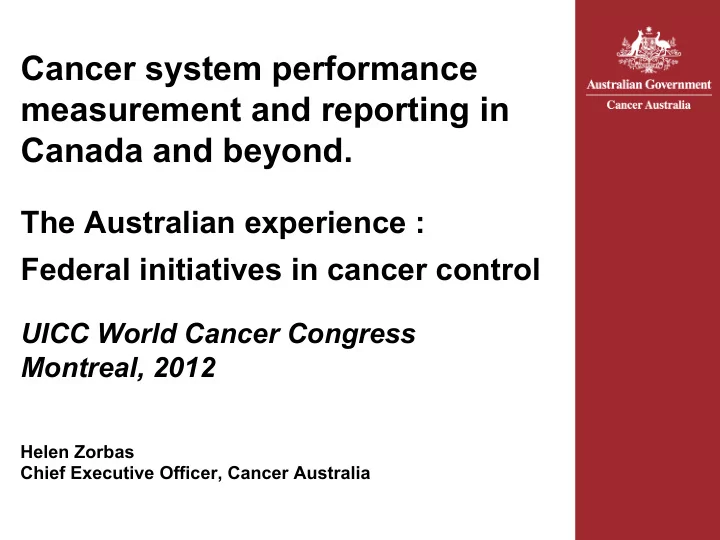

Cancer system performance measurement and reporting in Canada and beyond. The Australian experience : Federal initiatives in cancer control UICC World Cancer Congress Montreal, 2012 Helen Zorbas Chief Executive Officer, Cancer Australia
Cancer Australia Act 2006 Cancer Australia has the following functions: a) to provide national leadership in cancer control; b) to guide scientific improvements to cancer prevention, treatment and care; c) to coordinate and liaise between the wide range of groups and health care providers with an interest in cancer; d) to make recommendations to the Commonwealth Government about cancer policy and priorities; e) to oversee a dedicated budget for research into cancer; f) to assist with the implementation of Commonwealth Government policies and programs in cancer control; g) to provide financial assistance, out of money appropriated by the Parliament, for research mentioned in paragraph (e) and for the implementation of policies and programs mentioned in paragraph (f); h) any functions that the Minister, by writing, directs Cancer Australia to perform.
Australian cancer context • Cancer is the leading cause of burden of disease in Australia • Incidence is rising and this is likely to continue • 1 in 2 males and 1 in 3 females will be diagnosed with cancer before the age of 85 years • In 2012, more than 120,000 Australians are expected to be diagnosed with cancer • Approximately 1/3 of these patients live outside metro areas • Cancer survival rates continue to improve over time • Variations in outcomes exist
National policy environment National Healthcare Agreement • Intergovernmental commitment to improve health outcomes and ensure sustainability of system • Performance indicators: • 7 cancer-related • 4 lifestyle risk factors • annual performance report published National Health Information Agreement • Establish nationally agreed priorities • Develop and endorse common standards; NMDS National Health Performance Authority
National reporting of cancer data Based on Australian Institute of Health and Welfare material
National cancer data initiatives Increase data Enhance data Improve data availability quality consistency Cancer Australia AIHW • Data set • National Centre for specifications Monitoring Cancer • National data on (NCMC) cancer stage and • NCMC Framework treatment
National clinical data sets National Cancer Clinical Data Set Gynae Breast cancer Lung cancer cancers DSS DSS DSS Adolescent Cancer tissue and young banking DSS adults DSS Prostate Testicular cancer DSS cancer DSS
National stage and treatment data • Currently no national data on the stage of cancer at diagnosis, the treatments applied or frequency of recurrence • Cancer Australia is currently funding two pilot projects to investigate data collection methodologies on stage, treatment and recurrence • If applied nationally, would enable examination of survival and patterns of care by stage and international benchmarking.
National data focus • Significant burden of disease, increasing incidence, 2 nd most common cause of death • Need for data to further understand the cancer pathway, the resources applied , the impact of interventions, and to explore QOL • Challenges include the differing legislative and administrative approaches, data sources and data gaps • Timely to strengthen a national approach to data collection to improve patient outcomes.
www.canceraustralia.gov.au
Cancer system performance measurement and reporting in Canada and beyond: The Australian experience: state initiatives in Cancer Control Sanchia Aranda Director of Cancer Services and Information
Cancer Institute NSW Government agency solely dedicated to improving cancer outcomes through: – Reducing the incidence of cancer – Improving survival from cancer – Improving the quality of life of people affected by cancer
Key Directions • Shift from data reporting – Cancer Incidence, Mortality and Survival Reports • To Information for System Performance – Need for more granular data – Creation of a single data repository for cancer – Increased engagement with clinicians – Closer connections to Local Health Districts
e.g. Surgical Outcomes • To confirm the magnitude and direction of volume-outcome relationships in rarer and complex curative surgical resections • Bringing together datasets that have independently existed for 40 years • Published de-identified volume data in public domain
OESOPHAGUS CANCER SURGERIES Mean procedure volume in NSW, 2005-2008
State Challenges & Enablers • 6 state clinical registries with differing data standards • Clinicians who see clinical registries as their personal database • Moving clinical registries to see the system versus institutional picture • EviQ identifiers • Oncology Medical Information Systems
National Enablers • Data Standards • Minimum data set specifications • Best practice guidelines against which to assess performance • National reporting and benchmarking
National Challenges • Who owns the data? – National reporting versus local accountability – Medicare and Pharmaceutical data • Differences in data collections and how these are managed in national reports • Collaboration to avoid duplication • Cross border data sharing
Recommend
More recommend